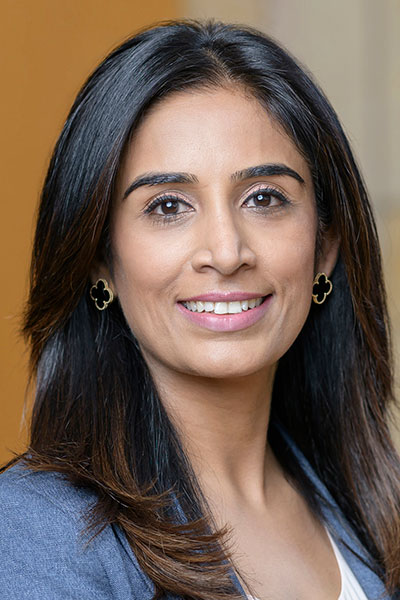
Translational medicine is a rapidly growing discipline, and as it grows, so do its controversial topics. SABCS has developed a new “lightning discussion” session format to highlight and present opinions on these topics.
Translational Controversies, set for 2:00 pm – 3:00 pm CT, Thursday, December 8, in the Stars at Night Ballroom 1&2, will highlight three controversies within this area of interdisciplinary medicine. Speakers will not be taking strong “pro” and “con” stances, but instead will be using examples and discussion to explore differing approaches, according to Komal Jhaveri, MD, FACP, medical oncologist and clinical researcher at Memorial Sloan Kettering Cancer Center, who will serve as moderator for the session.
There will be 20 minutes allotted for each of the three topics. In those 20 minutes, two expert discussants will each provide examples for 7 minutes, leaving 6 minutes of discussion, and possibly time to address audience questions.
Topic 1: RIP MTD
Discussants: Hope S. Rugo, MD, FASCO, Professor of Medicine, University of California San Francisco, and Geoffrey Shapiro, MD, PhD, Director, Early Drug Development Center, Dana-Farber Cancer Institute
Safety-driven maximum tolerated dose has been the historic basis for drug development and has yielded approval for many agents in breast cancer. However, this approach has now come into question as we evaluate the balance of efficacy and toxicity. This session will take a closer look at the push for dose optimization and the FDA’s Project Optimus, rather than relying solely on a safety-driven maximum tolerated dose to identify the recommended phase 2 dose for new therapies.
Dose optimization refers to allocation of the MTD/RP2D defined traditionally to a lower dose level that could maintain similar biologic effectiveness. Discussants will consider clinical data supporting exploration of lower doses of approved drugs with similar efficacy and reduced toxicity, as well as patient and physician surveys from the patient-centered dosing initiative project.
One important question is whether the exploration of optimal dose should be conducted in Phase I trials, or whether the definition of dose for registration-based trials should be done in the phase II setting, when it is clear that a new therapy has proven clinical benefit.
Additional questions that this session will consider: If optimization is done early, how many patients might be exposed to ineffective doses of drugs? Could effective drugs be lost to development due to inadequate dosing? If optimization is performed in the phase II setting, how many patients might be exposed to unnecessarily high doses of drug that require dose delays or dose reductions and lead to early discontinuation—again impacting the potential to identify effective agents? The discussants will also address the difficulty of defining endpoints in optimization studies, stressing the need for selecting the right drug for the right patient at the right time in the right setting.
Topic 2: Randomized trials vs real-world evidence
Discussants: Angela DeMichele, MD, MSCE, Breast Cancer Research Program Co-Leader, Penn Medicine, University of Pennsylvania, and Sean Khozin, MD, MPH, Research Affiliate, Massachusetts Institute of Technology (MIT)
Randomized controlled trials (RCTs) are a necessary tool for estimation of effect size while controlling for confounding variables to minimize error and thus support regulatory drug approval. However, RCTs are far from perfect due to patient access issues and lack of generalizability of the results to a broader population, and they are sometimes flawed with negative results due to the lack of studying the right drug in the right setting for the right patient.
Real-world data (RWD) can help interrogate whether the efficacy demonstrated in RCTs translates into effectiveness in routine practice and investigate patient access to new treatments but can be fraught with the risk of inherent biases, and non-optimal data quality/data integrity. When there is a discordance between a real-world study and an RCT, it is the latter that is usually considered pristine because of the way it is conducted.
Using specific examples, Drs. DeMichele and Khozin will highlight the complementary existence of RCTs and RWD and review the evolving perspectives and issues we face at the point of care, including but not limited to design features and endpoints that matter. Lastly, they will suggest some steps multiple stake holders need to take to pave the way forward and further improve patient outcomes.
Topic 3: Ki67
Discussants: Nadia Harbeck, MD, PhD, Breast Center Director, LMU University Hospital, and Torsten Nielsen, MD, PhD, FRCPC, Professor of Medicine, University of British Columbia
The third topic concerns a long-standing controversy that has been recently re-ignited by the FDA’s conditional approval of abemaciclib based on Ki67 index. Proliferation is central to cancer prognosis, to the mechanism of action of many anticancer therapies, and to the assessment of their benefit.
Ki67, an inexpensive immunohistochemical test readily available to pathology labs around the world, has many excellent features as a biomarker of proliferation, but has been dogged by controversy over its analytical validity in clinical practice.
Dr. Harbeck will discuss the clinical utility of Ki67, as centrally assessed in clinical trials, for prognosis, abemaciclib risk-benefit, endocrine response, and the need for chemotherapy in early breast cancer. Dr. Nielsen will describe what is needed to standardize Ki67 assessment in clinical practice such that reproducible scores can be obtained, particularly if a specific decision-making cutpoint is to be applied. Together they aspire to present a current consensus of why, when, where, and how Ki67 testing of breast cancer should be performed.

